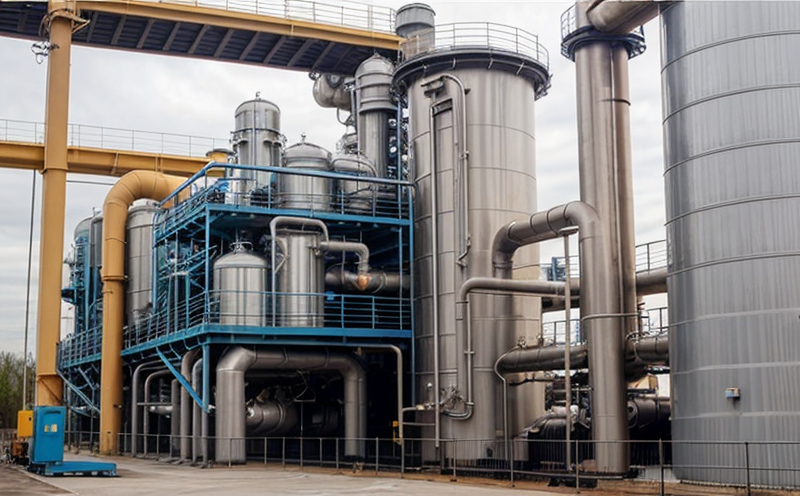Process reactor inspection
The process reactor is a critical component in numerous industrial processes that involve chemical reactions. These reactors are designed to maintain precise conditions that ensure optimal reaction rates and product quality. Given the importance of these reactors, it is crucial to inspect them regularly to ensure they operate reliably and safely over their service life.
Our process reactor inspection service ensures that all critical aspects of the reactor’s structure and functionality are evaluated through a comprehensive inspection plan. This includes checking for signs of wear, corrosion, and any potential structural weaknesses. By performing these inspections, we can identify issues early on, preventing costly downtime and ensuring regulatory compliance.
The inspection process starts with a thorough review of the reactor's design documentation and operational history. This helps us understand the specific requirements and expected conditions under which the reactor operates. Following this, our team conducts an in-depth visual inspection, examining every part of the reactor for any visible signs of damage or degradation. This includes checking internal components and external surfaces.
Non-destructive testing (NDT) techniques are employed to further assess the integrity of the reactor. Common NDT methods used include ultrasonic testing, radiographic examination, magnetic particle inspection, and eddy current testing. These tests provide detailed information about the internal condition of the reactor without causing any damage.
Once all inspections are complete, our team prepares a detailed report summarizing the findings from both visual and non-destructive testing. This report includes recommendations for necessary maintenance actions or repairs to ensure continued safe operation of the reactor. Compliance with relevant international standards is ensured throughout this process, thereby guaranteeing that the inspection meets the highest industry standards.
Our expertise in this field allows us to provide accurate assessments tailored specifically to each client's unique requirements and specifications. By offering detailed insights into potential risks associated with operating a particular type of reactor, we empower our clients with knowledge they need to make informed decisions regarding maintenance schedules and operational strategies.
Scope and Methodology
| Inspection Type | Description | Methodology |
|---|---|---|
| Visual Inspection | Thorough examination of the reactor's exterior and interior components for visible signs of damage or degradation. | Conducted by experienced engineers using specialized equipment to ensure comprehensive coverage. |
| Ultrasonic Testing | Determines internal flaws within the reactor walls through high-frequency sound waves. | Uses advanced technology to capture detailed images of the reactor's internal structure, highlighting areas requiring attention. |
| Magnetic Particle Inspection | Identifies surface and near-surface defects by applying magnetic fields followed by particle application. | Involves precise application techniques ensuring accurate detection even in tight spaces. |
| Radiographic Examination | Generates images of the reactor’s internal structure via controlled radiation exposure. | Precisely calibrated machines produce clear, high-resolution images for detailed analysis. |
| Eddy Current Testing | Detects flaws in conductive materials by inducing electrical currents within them. | Advanced probes are used to scan the reactor’s surface and internal components efficiently. |
The scope of our process reactor inspection service extends beyond just performing tests; it encompasses a holistic approach towards maintaining the integrity and reliability of industrial reactors. We employ state-of-the-art technologies and methodologies that comply with recognized international standards such as ISO 9712 for NDT practices.
Our commitment to excellence ensures that every aspect of our inspections is conducted meticulously, providing clients with reliable information they can trust. This approach not only helps in identifying potential issues early but also promotes long-term safety and efficiency in industrial operations.
Why Choose This Test
Selecting the right inspection method for your process reactor is essential to ensure its continued safe and efficient operation. Our process reactor inspection service provides several key advantages over other options available on the market:
- Compliance with Industry Standards: Ensures adherence to recognized international standards like ISO 9712, enhancing credibility and trustworthiness.
- Precision and Accuracy: Utilizes cutting-edge technology and methodologies that deliver highly accurate results every time.
- Early Detection of Issues: Identifies potential problems before they become critical issues, preventing costly repairs or replacements.
- Non-Destructive: Allows for repeated inspections without causing any damage to the reactor structure, preserving its integrity and functionality.
- Comprehensive Coverage: Provides a thorough evaluation of all aspects of the reactor, ensuring no area is overlooked during the inspection process.
- Expertise and Experience: Leverages years of experience in industrial process equipment inspections to deliver reliable assessments tailored specifically for each client’s unique needs.
By choosing our process reactor inspection service, you gain access to a team of highly skilled professionals who are dedicated to providing the highest quality of care throughout every step of the inspection process. This commitment translates into increased confidence and peace of mind regarding your reactor's performance and longevity.
Quality and Reliability Assurance
The quality and reliability assurance measures we implement during our process reactor inspections are designed to meet or exceed industry expectations. Our approach involves several key components that work together seamlessly to ensure consistent excellence in every inspection:
- Pre-inspection Preparation: Conducting a thorough review of the reactor's design documentation and operational history ensures comprehensive understanding before starting any tests.
- In-Process Monitoring: Real-time tracking of test parameters during NDT procedures guarantees accurate data collection and interpretation.
- Post-Inpection Reporting: Producing detailed reports summarizing all findings allows for easy reference by stakeholders involved in the reactor's maintenance or operation.
- Continuous Improvement: Regularly updating our methodologies based on feedback from clients ensures that we always offer the latest advancements in process reactor inspection technology.
We take pride in maintaining a high level of integrity and transparency throughout all stages of our service delivery. From initial consultation to final report submission, we strive to deliver exceptional value to our customers through unwavering dedication and commitment.





